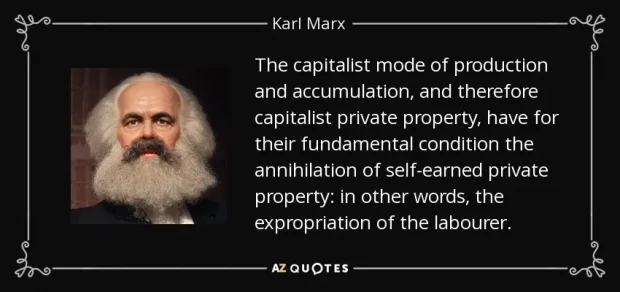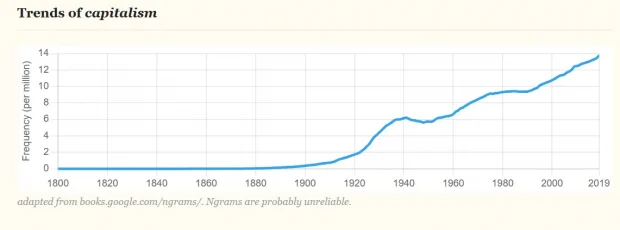Here we go again with some more Marx bashing, even though he did not coin the expression ‘capitalism’. He just popularized it. The word is rooted in Latin, meaning head. The one people loose when they are decapitated. Or the place where the head of the state resides: the capital.
It was used to head-count cattle. The number of (cattle) heads was your capital.
 Brave New World and Br...
Best Price: $1.65
Buy New $5.06
(as of 01:20 UTC - Details)
It was first used in an economic sense in the eighteenth century, describing the necessity of capital accumulation to engage in some productive activities. No moral content. Why should there be any? Most human activities have some prerequisites. When a peasant is tilling his field then sow some seed, it is a multilayer investment of his time, labour, the use of his beast of burden – that needs to be fed – and his capital of seed.
Brave New World and Br...
Best Price: $1.65
Buy New $5.06
(as of 01:20 UTC - Details)
It was first used in an economic sense in the eighteenth century, describing the necessity of capital accumulation to engage in some productive activities. No moral content. Why should there be any? Most human activities have some prerequisites. When a peasant is tilling his field then sow some seed, it is a multilayer investment of his time, labour, the use of his beast of burden – that needs to be fed – and his capital of seed.
Investing in a machinery and a factory building, or seven trillion dollars (“f*ck it, let’s make it eight”) in creating Artificial General Intelligence is not qualitatively different.
But let me get back to this later…
Radical socialists started using the expression ‘capitalism’ in a derogatory manner in the early nineteenth century and its use became widespread after the publication of the communist manifesto and later Das Kapital. This is a graph of the trend of the use of the term:
We could ask what is the reason for this ever-increasing popularity? Why did a ………….
I had to stop as I was to say “mode of production” realizing that there is nothing I can say about the economy without the heavily loaded terminology of Karl Marx, that hate-filled, self referencing, pompous and arrogant blabber.
Marx is the perfect example of the Humpty-Dumpty talk where words mean just what he chooses them to mean, neither more nor less. Just try to absorb the words in this quote:

“The capitalist mode of production and accumulation, and therefore capitalist private property, have for their fundamental condition the annihilation of self-earned private property: in other words, the expropriation of the labourer.”
There is so much BS packed into this one sentence that it could take a lengthy post to properly dissect it, but let me try a short ‘translation’ if you will:
 Disciplines of a Godly...
Best Price: $5.84
Buy New $6.87
(as of 11:16 UTC - Details)
Disciplines of a Godly...
Best Price: $5.84
Buy New $6.87
(as of 11:16 UTC - Details)
Advanced, high-productivity, low-cost manufacturing can only exist with the elimination of the high-cost, low-productivity craftsmen “mode of production”; making the displaced labour force available to become industrial workers.
Of course, the whole argument is standing on its head, but that is the least of its problems.
What we are talking about is what Joseph Schumpeter called “creative destruction”.
More efficient production methods are replacing les efficient ones.
When Marx says “mode of production” he does not mean any particular method of production, he means that “evil, greedy, resource hording, exploitative CAPITALIST way of production.”
There is no ‘annihilation’ and ‘expropriation’. The workers do not become the property of the capitalists and nobody’s ‘self-earned private property’ is ‘annihilated’
In the mind of Marx, those little people have absolutely no agency over their own fate and decisions. He couldn’t possibly imagine, that they chose their jobs because for them, with its regular salary, it was a step-up from the penury of subsistence farming.
Marx’s formulation is just a derogatory insult, an incendiary, moralizing judgement disguised as an impartial – and in his mind – even ‘scientific’ explanation.
Das Kapital is not an explanation of a particular kind of economic reality, but an impassioned justification and appeal for its destruction.
Without – of course – offering ANY viable, reasonable alternative. This post, however, is not about Marx. It is about his idea.





